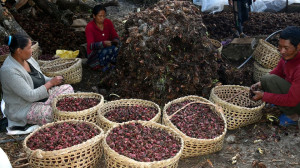Money
Bheri-Babai project being rushed to meet deadline
The much-delayed Bheri-Babai Diversion Multipurpose Project located in the Mid-Western Region has begun to gain momentum.
Prakash Adhikari
The much-delayed Bheri-Babai Diversion Multipurpose Project located in the Mid-Western Region has begun to gain momentum. Work at the national pride project has been expedited to meet its completion deadline of February 2019.
The project is being developed with the government’s own resources. It is expected to generate Rs4.50 billion in revenue annually—Rs2 billion from electricity and Rs2.50 billion from agriculture.
The total cost of the project is around Rs16 billion. The multipurpose project will divert 40 cubic metres per second of water from the Bheri River to the Babai River to irrigate 51,000 hectares of land round the year in Banke and Bardia districts besides generating 48 MW of energy.
According to project officials, initial work on the tunnel which will carry water from the Bheri to the Babai is nearing completion. For the first in Nepal, the project will be using a tunnel boring machine which can dig 15-60 metres of tunnel daily.
The Indian trade embargo that led to severe shortages of fuel and construction materials at almost all the development projects did not affect the Bheri-Babai Diversion Multipurpose Project.
Mani Raj Dhakal, a senior engineer of the project, said that they had completed the construction of a platform for digging the tunnel including other infrastructure like a road and lab test building.
“After the necessary infrastructure is ready, tunnel boring machines will be used. We have planned to import the machine from China in seven to eight months.”
The machine will be used to dig a 12-km-long and 4.2-metre-wide tunnel between the Bheri and Babai rivers. The machine will take over after workers have manually dug 150 metres of the tunnel, he said. There are 26 Chinese and 260 Nepali workers currently engaged at the project site. The China Overseas Engineering Group has been awarded the construction contract for the headrace tunnel.
The contractor has asked for the establishment of a security post at the construction site due to frequent brawls among the Nepali workers that have been affecting work at the project, according to officials.
The government plans to implement the project in two stages—diversion and irrigation components. The diversion component consists of the headwork, headrace tunnel and powerhouse while the irrigation component is being implemented through a separate project, namely the Babai Irrigation Project.
Along with the construction of a tunnel, the project has targeted completing the powerhouse.
The late prime minister Sushil Koirala had led the groundbreaking ceremony
for the powerhouse of the Bheri Babai Diversion Multipurpose Project in April last year.
The project is one of the country’s ambitious projects. It is expected to ease the food crisis in the Mid-Western Region by increasing production. The government had invited bids for the project in July 2012, but lack of resources and delays in appointing a contractor prevented the four-year project from moving ahead in time.




 15.28°C Kathmandu
15.28°C Kathmandu















